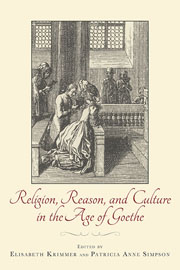Book contents
- Frontmatter
- Contents
- Acknowledgments
- Introduction
- I Wieland and Herder
- II Schiller and Goethe
- 3 Clever Priests and the Missions of Moses and Schiller: From Monotheism to the Aesthetic Civilization of the Individual
- 4 “Then Say What Your Religion Is”: Goethe, Religion, and Faust
- 5 Classicism and Secular Humanism: The Sanctification of Die Zauberflöte in Goethe's “Novelle”
- III Kleist and Hölderlin
- IV Leibniz, Spinoza, and Their Legacy
- Notes on the Contributors
- Index
3 - Clever Priests and the Missions of Moses and Schiller: From Monotheism to the Aesthetic Civilization of the Individual
from II - Schiller and Goethe
Published online by Cambridge University Press: 05 December 2013
- Frontmatter
- Contents
- Acknowledgments
- Introduction
- I Wieland and Herder
- II Schiller and Goethe
- 3 Clever Priests and the Missions of Moses and Schiller: From Monotheism to the Aesthetic Civilization of the Individual
- 4 “Then Say What Your Religion Is”: Goethe, Religion, and Faust
- 5 Classicism and Secular Humanism: The Sanctification of Die Zauberflöte in Goethe's “Novelle”
- III Kleist and Hölderlin
- IV Leibniz, Spinoza, and Their Legacy
- Notes on the Contributors
- Index
Summary
Es ist ein armseliges kleinliches Ideal, für eine Nation zu schreiben.
[It is a pathetic, petty ideal to write for only one nation.]
—Schiller's letter to Körner of 13 October 1789By 1788, Friedrich schiller (1759-1805) could look back on nearly a decade of blasphemous production regarding prophets, priests, and organized religion. In 1789, after several years of assaulting the negative social and political functions of Jesus Christ and Christianity, Schiller, then a professor of history, turned his attention to the Hebrew prophet Moses in the lecture “Die Sendung Moses” (The Mission of Moses or The Legation of Moses), delivered at the University of Jena in the summer of 1789 and published in Schiller's journal Thalia in 1790. In light of recent charges of blasphemy (and—in an insightless or disingenuous smear attempt—polytheism) inspired by his poem “Die Götter Griechenlandes” (The Gods of Ancient Greece) in 1788, Schiller's Moses essay comprises both a response to the charges and an articulation of his earlier criticisms of religion. In the Moses essay, Schiller moves beyond the concerns of the political misuses of and intellectual detours posed by Christianity in contemporary European states to an explanation of the original paradigmatic political purposes of religion and the initial civilizing effect of monotheism as a step toward a constitution based on reason for all humankind.
- Type
- Chapter
- Information
- Religion, Reason, and Culture in the Age of Goethe , pp. 79 - 98Publisher: Boydell & BrewerPrint publication year: 2013



